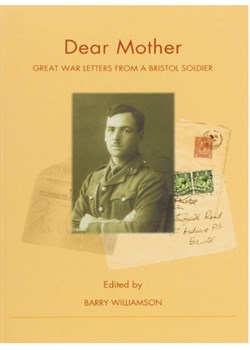'Dear Mother Great War letters From A Bristol Soldier'
- Home
- World War I Book Reviews
- 'Dear Mother Great War letters From A Bristol Soldier'

ISBN: 1 904537 07 3 SB 144 pp £7.99
Published by RedcliffePress Ltd, 81g Pemroke Rd, Bristol BS83EA.
”Dear Mother” is one of those treats that crop up all too rarely; a lovingly preserved collection of private letters that have survived the passage of time. The book has two stories to tell. First the short life of a young soldier; and second the amazing story of how the letters were discovered and brought to a wider audience.
The story begins in Bristol in March 2001, with the Bristol Grammar School’s War Memorial. Stanley Booker’s name was selected at random by a class of year 9 pupils, as part of their study of the Great War. There the story may have ended, having gleaned that Lieutenant Stanley Booker died of wounds sustained attempting the rescue of a wounded comrade, at Neuve Chapelle on the 10th October 1916, whilst serving with the 2/7th Battalion of the Worcestershire Regiment. The persistence of several pupils to search for the Booker family eventually bore fruit and this book is the result.
The Editor and same year 9 history teacher has done a fine job in presenting Booker’s letters in such a readable form. The letters begin with Booker as an undergraduate at Oxford, and continue through training, and finish with accounts of active service in France. The last letter was sent home shortly before his death.
In addition to the richness of the letters, there are accounts from fellow officers giving details of the manner of Booker’s death. These include sketches and plans of the cemetery and grave marker. The book is well illustrated throughout, with a well written preface and introduction; add to that comprehensive notes and a good index, and the end result is a book fitting to the memory Lieutenant Stanley Booker.
This book will appeal to a wide range of readership.
The military and general history readers alike are well catered for; with clear military notes and trench maps of the battlefield for the historian.
On a general history level the letters reveal an intelligent and sensitive young man, with a clear idea of what he is fighting for. He feels he is fighting for a cause, and accepts the price that may be asked of him for that cause.
This reader is left admiring this young man and the ideals he shared with many of his contemporaries, and wonders how many other old trunks lie long forgotten in dusty attics; that contain the stories of other young men who went to war, and didn’t return.
Reviewer: Wayne Young





